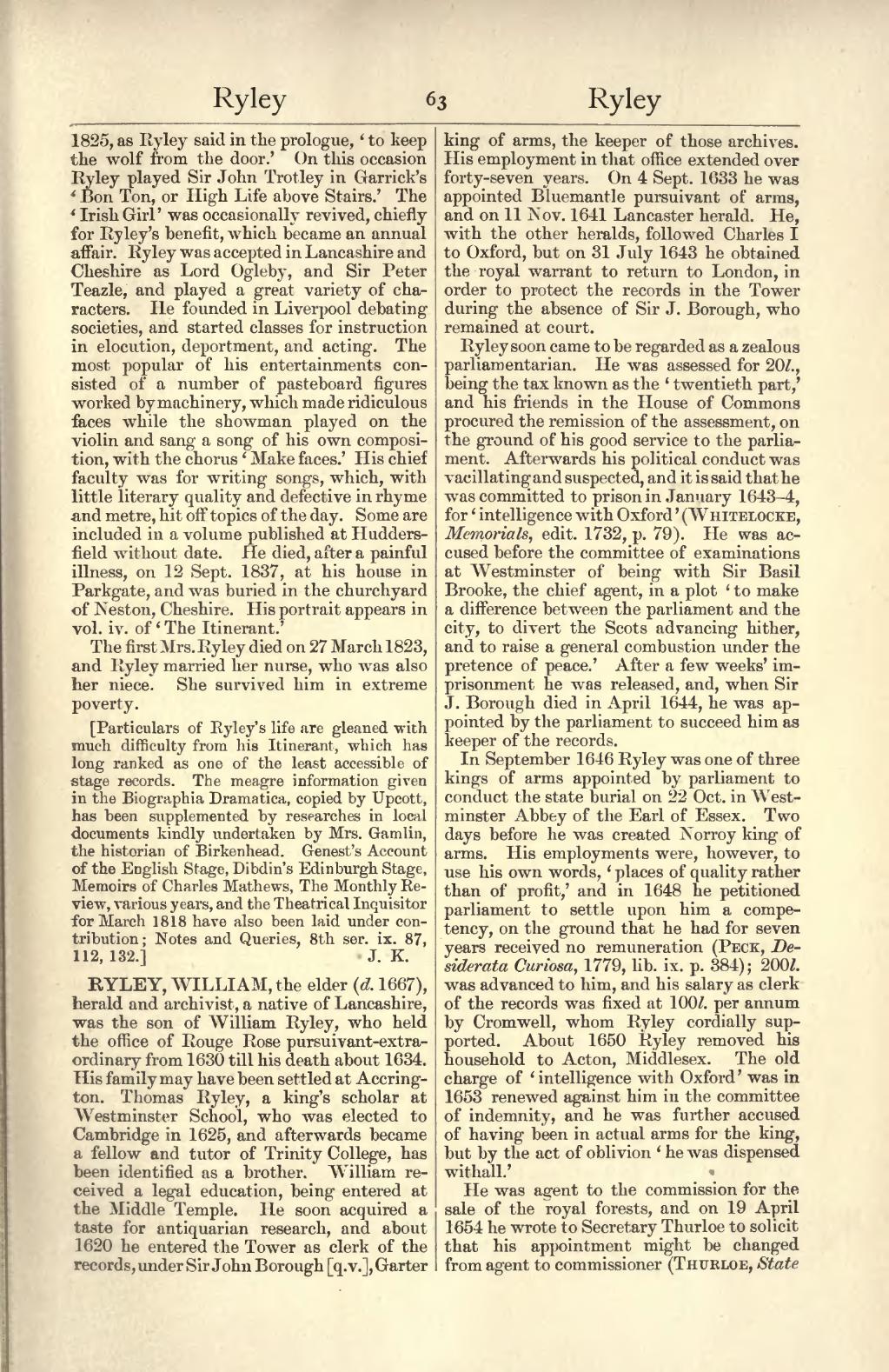1825, as Ryley said in the prologue, ‘to keep the wolf from the door.’ On this occasion Ryley played Sir John Trotley in Garrick's ‘Bon Ton, or High Life above Stairs.’ The ‘Irish Girl’ was occasionally revived, chiefly for Ryley's benefit, which became an annual affair. Ryley was accepted in Lancashire and Cheshire as Lord Ogleby, and Sir Peter Teazle, and played a great variety of characters. He founded in Liverpool debating societies, and started classes for instruction in elocution, deportment, and acting. The most popular of his entertainments consisted of a number of pasteboard figures worked by machinery, which made ridiculous faces while the showman played on the violin and sang a song of his own composition, with the chorus ‘Make faces.’ His chief faculty was for writing songs, which, with little literary quality and defective in rhyme and metre, hit off topics of the day. Some are included in a volume published at Huddersfield without date. He died, after a painful illness, on 12 Sept. 1837, at his house in Parkgate, and was buried in the churchyard of Neston, Cheshire. His portrait appears in vol. iv. of ‘The Itinerant.’
The first Mrs. Ryley died on 27 March 1823, and Ryley married her nurse, who was also her niece. She survived him in extreme poverty.
[Particulars of Ryley's life are gleaned with much difficulty from his Itinerant, which has long ranked as one of the least accessible of stage records. The meagre information given in the Biographia Dramatica, copied by Upcott, has been supplemented by researches in local documents kindly undertaken by Mrs. Gamlin, the historian of Birkenhead. Genest's Account of the English Stage, Dibdin's Edinburgh Stage, Memoirs of Charles Mathews, The Monthly Review, various years, and the Theatrical Inquisitor for March 1818 have also been laid under contribution; Notes and Queries, 8th ser. ix. 87, 112, 132.]
RYLEY, WILLIAM, the elder (d. 1667), herald and archivist, a native of Lancashire, was the son of William Ryley, who held the office of Rouge Rose pursuivant-extraordinary from 1630 till his death about 1634. His family may have been settled at Accrington. Thomas Ryley, a king's scholar at Westminster School, who was elected to Cambridge in 1625, and afterwards became a fellow and tutor of Trinity College, has been identified as a brother. William received a legal education, being entered at the Middle Temple. He soon acquired a taste for antiquarian research, and about 1620 he entered the Tower as clerk of the records, under Sir John Borough [q. v.], Garter king of arms, the keeper of those archives. His employment in that office extended over forty-seven years. On 4 Sept. 1633 he was appointed Bluemantle pursuivant of arms, and on 11 Nov. 1641 Lancaster herald. He, with the other heralds, followed Charles I to Oxford, but on 31 July 1643 he obtained the royal warrant to return to London, in order to protect the records in the Tower during the absence of Sir J. Borough, who remained at court.
Ryley soon came to be regarded as a zealous parliamentarian. He was assessed for 20l., being the tax known as the ‘twentieth part,’ and his friends in the House of Commons procured the remission of the assessment, on the ground of his good service to the parliament. Afterwards his political conduct was vacillating and suspected, and it is said that he was committed to prison in January 1643–4, for ‘intelligence with Oxford’ (Whitelocke, Memorials, edit. 1732, p. 79). He was accused before the committee of examinations at Westminster of being with Sir Basil Brooke, the chief agent, in a plot ‘to make a difference between the parliament and the city, to divert the Scots advancing hither, and to raise a general combustion under the pretence of peace.’ After a few weeks' imprisonment he was released, and, when Sir J. Borough died in April 1644, he was appointed by the parliament to succeed him as keeper of the records.
In September 1646 Ryley was one of three kings of arms appointed by parliament to conduct the state burial on 22 Oct. in Westminster Abbey of the Earl of Essex. Two days before he was created Norroy king of arms. His employments were, however, to use his own words, ‘places of quality rather than of profit,’ and in 1648 he petitioned parliament to settle upon him a competency, on the ground that he had for seven years received no remuneration (Peck, Desiderata Curiosa, 1779, lib. ix. p. 384); 200l. was advanced to him, and his salary as clerk of the records was fixed at 100l. per annum by Cromwell, whom Ryley cordially supported. About 1650 Ryley removed his household to Acton, Middlesex. The old charge of ‘intelligence with Oxford’ was in 1653 renewed against him in the committee of indemnity, and he was further accused of having been in actual arms for the king, but by the act of oblivion ‘he was dispensed withall.’
He was agent to the commission for the sale of the royal forests, and on 19 April 1654 he wrote to Secretary Thurloe to solicit that his appointment might be changed from agent to commissioner (Thurloe, State
